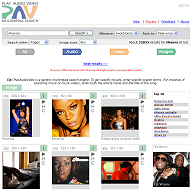
Munax
Encyclopedia
Munax is a Swedish
company which develops large hyper-parallel execution (LHPE) search engine systems. Founded in March 2007, its headquarters are in Stockholm
. The company produces Munax XE, an all-content search engine that allows users to preview audio and video files with the option to transcode
multimedia file to other formats. Customers include vertical search
engines and mobile operators. The company's name is derived from Munin, one of the two ravens of the Norse
god Odin
, and the binomial
designation for the raven, corvus corax.
. A second version, Munax XE, was released in 2006. Munax XE allows for installation and scaling across multiple computers connected on a local area network
or through the Internet.
 PlayAudioVideo is a multimedia search engine that allows users to search for audio, video and image files.Development began in July 2007, with initial beta testing in December 2007 followed by a public release of PlayAudioVideo beta 1 in February 2008. PlayAudioVideo beta 2 opened in June 2008 with larger content and new features.
PlayAudioVideo is a multimedia search engine that allows users to search for audio, video and image files.Development began in July 2007, with initial beta testing in December 2007 followed by a public release of PlayAudioVideo beta 1 in February 2008. PlayAudioVideo beta 2 opened in June 2008 with larger content and new features.
Sweden
Sweden , officially the Kingdom of Sweden , is a Nordic country on the Scandinavian Peninsula in Northern Europe. Sweden borders with Norway and Finland and is connected to Denmark by a bridge-tunnel across the Öresund....
company which develops large hyper-parallel execution (LHPE) search engine systems. Founded in March 2007, its headquarters are in Stockholm
Stockholm
Stockholm is the capital and the largest city of Sweden and constitutes the most populated urban area in Scandinavia. Stockholm is the most populous city in Sweden, with a population of 851,155 in the municipality , 1.37 million in the urban area , and around 2.1 million in the metropolitan area...
. The company produces Munax XE, an all-content search engine that allows users to preview audio and video files with the option to transcode
Transcode
Transcoding is the direct digital-to-digital data conversion of one encoding to another, such as for movie data files or audio files. This is usually done in cases where a target device does not support the format or has limited storage capacity that mandates a reduced file size, or to convert...
multimedia file to other formats. Customers include vertical search
Vertical search
A vertical search engine, as distinct from a general web search engine, focuses on a specific segment of online content. The vertical content area may be based on topicality, media type, or genre of content. Common verticals include shopping, the automotive industry, legal information, medical...
engines and mobile operators. The company's name is derived from Munin, one of the two ravens of the Norse
Norse mythology
Norse mythology, a subset of Germanic mythology, is the overall term for the myths, legends and beliefs about supernatural beings of Norse pagans. It flourished prior to the Christianization of Scandinavia, during the Early Middle Ages, and passed into Nordic folklore, with some aspects surviving...
god Odin
Odin
Odin is a major god in Norse mythology and the ruler of Asgard. Homologous with the Anglo-Saxon "Wōden" and the Old High German "Wotan", the name is descended from Proto-Germanic "*Wodanaz" or "*Wōđanaz"....
, and the binomial
Binomial nomenclature
Binomial nomenclature is a formal system of naming species of living things by giving each a name composed of two parts, both of which use Latin grammatical forms, although they can be based on words from other languages...
designation for the raven, corvus corax.
Overview
Jan-Olof Granlund began to develop the design specifications for Munax in 2002. The company's stated goal was to develop new algorithms for ranking, independent of the type of data, and to facilitate efficient distribution and scaling of processing power and data over a large cluster of computers. Implementation of these specifications commenced in 2003, and the first version (Munax P1) was released in 2005, powering the search engine Leit.isLeit.is
Leit.is an Icelandic internet search engine developed by the corporation Leit.is ehf. It is available both in an Icelandic and an English version and was launched on June 16, 1999...
. A second version, Munax XE, was released in 2006. Munax XE allows for installation and scaling across multiple computers connected on a local area network
Local area network
A local area network is a computer network that interconnects computers in a limited area such as a home, school, computer laboratory, or office building...
or through the Internet.
PlayAudioVideo


